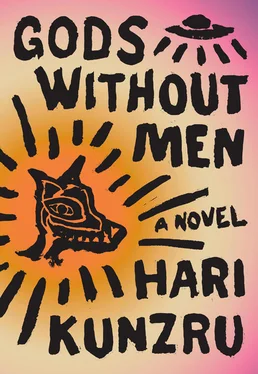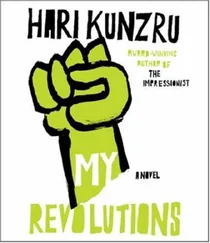“What are you doing?”
“I’m not giving up.”
“Stop, Jaz! Please stop! It’s dangerous!”
The car vibrated. Jaz swung the wheel left and right to avoid large rocks. They were gradually climbing uphill. Eventually there was a massive jolt as they ran over something and came to a shuddering halt, the airbags deploying, filling up the car like giant white marshmallows. Jaz seemed not to care, struggling out of his seat belt and flinging open the door. He pulled Raj out of the car and set him on his shoulders.
“Come on!”
Sobbing, Lisa followed them. There was a cut above her eye. Blood was blurring her vision. Raj was babbling, a stream of wordless nonsense that rose in tone until it sounded more like a chirruping bird or a fax machine than human speech. They scrambled up a talus slope, Jaz reaching out a hand to help her over the difficult parts. Little avalanches of stones skipped down behind them. She could feel the heat exhaled from the earth. She no longer cared what happened to her. The world had reduced itself to the slippery gravel beneath her feet, her ragged breathing. At last they stood together on the ridge of the hill, sweating and gasping for breath, the three of them holding hands and looking out across the great basin below. In the distance, the only form to break the flat surface was the three-fingered hand of the Pinnacle Rocks. They could see no evidence of anything wrong. There was no cloud, no column of fire, no toxic mist. The air was blue. Ahead of them lay only a vast emptiness, an absence. There was nothing out there at all.
From the daily record prepared by Padre Fray Francisco Garcés, son of the Colegio de la Santa Cruz, Queretáro, of the journey that he made in this year 1775 by order of His Excellency Don Antonio María Bucareli y Ursúa, Lieutenant-General, Viceroy, Governor and Captain-General of this New Spain, as made known in his letter of January 2nd of the said year and decided upon by the council of war held at México on November 28th of the year preceding; and by order likewise of the Padre Fray Romualdo Cartagena, Guardian of the said Colegio, in his letter of January 20th 1775, in which Fray Garcés was directed to look over the lands west of the river Colorado and treat with the neighboring nations, to determine if they were disposed and ready for receiving the catechism and becoming subjects of our Sovereign. The following passage was suppressed before the declaration of Imprimatur, confirmed by order of His Most Illustrious and Reverend Eminence, Carlo, Cardinal Rezzonico, Secretary of the Supreme Sacred Congregation of the Roman and Universal Inquisition .
154th day: In the last week I have traveled fourteen leagues on courses west and northwest, and today arrived at a ranchería of the Chemegueba nation, situated near a spring shaded by many palm trees. The men of the ranchería came forth and issued threats, and I believe I was spared martyrdom only by showing forth the image of the damned man, whereupon my tormentors were so afraid that they begged me to turn the painting round and show them once again the gentle face of Mary Most Holy. Accordingly I named the site of my reprieve, Aguaje de Kairos.
159th day: In the last four days I have traveled ten leagues on a westward course. My interpreters left this morning, saying that they had come to the limits of their country and here the country of their enemies begins. They begged me not to proceed farther, warning that ahead was only desolation. I was glad to see them go as I believe they are in league with the Adversary. I watched them go and indeed they were as fleet as deer.
164th day: Of food and water I have very little. Even mice and small lizards are scarce here and it is my greatest desire to find a well. I have seen no sweet water since Aguaje de Kairos. I am afflicted with visions and do not know whether they are the work of God or my Enemy, whose name I dare not write.
165th day: This day I lost my compass needle in ground riddled by cracks and fissures. I searched for several hours, digging out the cracks with my hands, but was unable to find it. My Enemy laughed at me, bidding me find my way by God’s holy light.
168th day: I climbed the San Ignacio range and looked down on an immense white plain, unbroken except for a butte whose three-spired shape I considered auspicious as a representation of the Trinity. There was no sign of water or herbage but I trusted in God and set forth toward this sign of His grace. From this high place I could see that beyond the plain was another range, and no doubt beyond that another, and my heart was filled with fear, for my hunger and thirst were such that the sound of the wind was like a running brook in my ears and the round white stones in my path had the appearance of loaves of bread.
168th day: I halted at the rocks of the Trinity. My Adversary bade me climb them and fling myself from the peak, commanding God’s angels to break my fall, but I trusted in Him to give me strength to walk forward on my two feet, though I cannot sail over the earth like the heathen runners or fly through the air like my hypocritical Adversary, who cloaks himself in sunlight like the white raiment of the just. Whatever has come from God has life only when it gazes back toward Him and this I did, looking away from the Adversary’s lying light, seeking the true light of God. My trust in Him is absolute, though I am sore beset.
As I rested in the shade of the rocks, it seemed to me that the sky was rent asunder and a dart of longing went out from my heart, piercing the veil that surrounded God, whose love boiled over and spilled down upon me as an angel in the form of a man with the head of a lion. And he spoke to me, saying that I was beloved and revealing certain mysteries concerning life and death, which as soon as they had been revealed receded into forgetfulness, for that which is infinite is known only to itself and cannot be contained in the mind of man. I received all this in silence and stillness and then the creature retreated into the sky and I was once again alone in this desert place.
Here ends the redacted passage .
This book was written in New York; Marfa, Texas; Sussex; Shelter Island; Spetses; Venice, California; and various hotel and motel rooms in California, Nevada, Arizona and Utah.
I would like to thank everyone who traveled with me, fed me, gave their hospitality and shared their ideas. I am particularly grateful to Carole and Richard Baron; Brooke Geahan; Jonny Geller; Ehab Khalaf; Katie Kitamura; Leonard Knight; Hardeep Singh Kohli; my parents, Ravi and Hilary Kunzru; Carobeth Laird; Allan Moyle and Chiyoko Tanaka; Geraldine Ogilvy; Meghan O’Rourke; Simon Prosser; Lauren Redniss; Bic Runga; James Surowiecki; George Van Tassel; Lucy Walker; Darryl Ward and Katherine Zoepf.
This book would not have existed without the support of the Dorothy and Lewis B. Cullman Center for Scholars and Writers at the New York Public Library and the friendship of my colleagues there during the 2008–2009 term. My thanks go to Jean Strouse and the staff of the library.
Fray Francisco Garcés existed. He did travel through Sonora, Arizona, and California in 1775–1776 and wrote about what he found. However, no part of that book (to my knowledge) was lost or suppressed as heretical.
Hari Kunzru is the author of the novels The Impressionist, Transmission and My Revolutions and the recipient of the Somerset Maugham Award, the Betty Trask Prize of the Society of Authors and a British Book Award. In 2003, Granta named him one of its twenty best young British novelists. He is deputy president of English PEN, a patron of the Refugee Council and a member of the editorial board of Mute magazine. His work has been translated into twenty-one languages and his short stories and journalism have appeared in diverse publications, including The New York Times, The Guardian, The New Yorker, The London Review of Books, Wired and The New Statesman .












